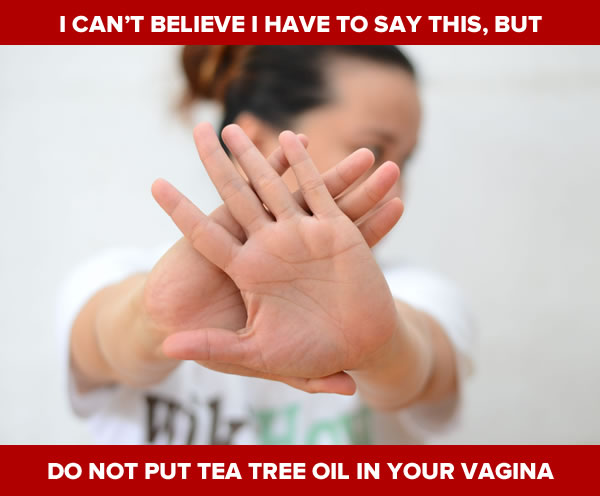
The clearance shelf at my local Publix is always a source of amusement. I’ve seen time-warped hair care products, the funniest adult diaper packaging, and products that I didn’t even know existed.
But tea tree oil vaginal suppositories is on a whole new, painful level. If you’ve ever had tea tree oil applied to a cut, you know that it stings like nothing else. It’s probably much worse when applied to the nether regions.

Later, I ran a search on the phrase tea tree oil vagina and discovered two things:
- I’m going to see some really weird-ass advertisements in my browser for the next couple of weeks, and
- “tea tree oil vagina” lives in what’s known as a keyword void.

A keyword void is defined as “a situation where searching for answers about a keyword returns an absence of authoritative, reliable results, in favor of ‘content produced by a niche group with a particular agenda.’”
One example of a particularly harmful keyword void is featured in a recent Wired article titled The complexity of simply searching for medical advice. The example concerns vitamin K, which is typically injected into newborns in the first few hours of their lives. Infants are born without enough vitamin K in their systems, and the vitamin prevents any potential bleeding. The problem is that if you Google for why vitamin K is administered to newborns, there aren’t enough factual articles, and this is a void that the anti-vaccine crowd has capitalized on.
Here’s the key excerpt:
There’s an asymmetry of passion at work. Which is to say, there’s very little counter-content to surface because it simply doesn’t occur to regular people (or, in this case, actual medical experts) that there’s a need to produce counter-content. Instead, engaging blogs by real moms with adorable children living authentic natural lives rise to the top, stating that doctors are bought by pharma, or simply misinformed, and that the shot is risky and unnecessary. The persuasive writing sounds reasonable, worthy of a second look. And since so much of the information on the first few pages of search results repeats these claims, the message looks like it represents a widely-held point of view. But it doesn’t. It’s wrong, it’s dangerous, and it’s potentially deadly.

“Tea tree oil vagina” exists in a keyword void. When I search for that term — and remember, everyone’s search results are different — the first page of results gives me an even split:
- 5 web pages that suggest that tea tree oil is a great way to reduce vaginal odor and eliminate yeast infections,
- a web page that says that studies of the use of tea tree oil to treat vaginal infections have been inconclusive,
- 4 web pages citing actual doctors telling you that for the love of everything good and holy, please don’t put tea tree oil in your vagina, and
- 3 links to videos (all of which are douchey in every sense of the word) that show you how to use tea tree oil to treat yeast infection and get rid of vaginal odor.
Simply put: don’t use those tea tree oil vaginal suppositories. They lead to nothing good.
I leave you with a link to this Bustle article featuring advice from Dr. Melissa Holmes, an OB/GYN and founder of Girlology.com: 9 Things You Should Never Put In Or On Your Vagina.